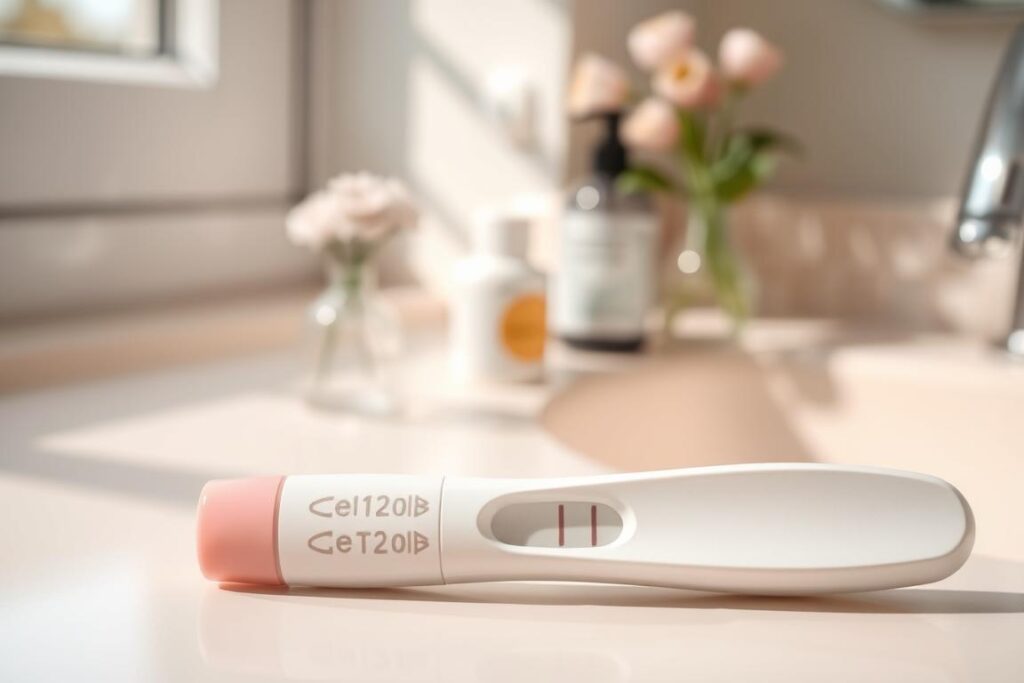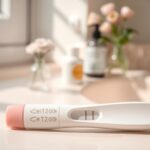Finding the right time to take a pregnancy test is key for getting accurate results. The sensitivity of these tests and the levels of human chorionic gonadotropin (hCG) matter a lot. Knowing when to take the test can help you get clear information about your pregnancy.
Key Takeaways
- Timing is essential for accurate pregnancy test results.
- hCG levels in the body determine the sensitivity of the test.
- Early testing may not detect a pregnancy if hCG levels are too low.
- Waiting until after a missed period can provide more reliable results.
- Following the test instructions carefully is crucial for accurate interpretation.
Understanding Pregnancy Tests and How They Work
Pregnancy tests look for the human chorionic gonadotropin (hCG) hormone in a woman’s body. This hormone comes from cells in the placenta. It helps the egg grow and supports the fetus early on. Tests, both urine and blood, find and measure this hormone.
Types of Pregnancy Tests Available
There are two main types of pregnancy tests: urine tests and blood tests. Urine tests are easy to buy and use at home. Blood tests, however, need a doctor and give more detailed info about hCG levels.
How Pregnancy Tests Detect hCG
Pregnancy tests find the hCG hormone in a woman’s body. When the fertilized egg implants, it starts making hCG. This hormone goes into the blood and urine. The test can spot and measure these levels, showing if a woman is pregnant.
Accuracy Rates of Different Test Types
The accuracy of pregnancy tests depends on the type and brand. Urine tests are 99% accurate after a missed period. Blood tests can be even more precise, with a sensitivity of up to 100 mIU/mL of hCG. But, timing, hydration, and some meds can change the test’s accuracy.
| Test Type | Accuracy Rate | Sensitivity (hCG level) |
|---|---|---|
| Urine Test | 99% accurate | 20 mIU/mL |
| Blood Test | Up to 100% accurate | 5-10 mIU/mL |
It’s key to know about the different pregnancy tests and how they work. This helps get accurate results. By understanding the accuracy and hCG detection levels, women can choose the best test for them.
Best Time of Day to Take a Pregnancy Test
Timing is key when it comes to pregnancy tests. The morning is often the best time, especially with your first-morning urine.
The morning urine has more of the pregnancy hormone, hCG. This concentrated hCG makes it easier for tests to find and show reliable results.
- The first urine of the day has the most hCG, as it builds up overnight.
- Using first-morning urine boosts your chances of finding a pregnancy early on.
- Results can still be accurate at other times, but hCG levels might not be as high.
If you’re trying to get pregnant or think you might be, test in the morning. It’s the best way to get a clear and accurate result.
“The first-morning urine is the best time to take a pregnancy test for the most accurate results.”
How Early Can You Take a Pregnancy Test
Many expecting parents wonder when they can take a pregnancy test. The answer varies based on when the fertilized egg implants and when hCG hormone levels rise.
Testing Before Missed Period
You can try a pregnancy test before a missed period, but the results might not be clear. Most tests can’t detect hCG until right after a missed period. Early detection tests, though, can spot pregnancy as early as 8-10 days post-conception, a few days before a missed period.
Testing After Missed Period
The best time to test is after a missed period. At this point, hCG levels are high enough for standard tests to pick up. Implantation happens 6-12 days after conception. Then, hCG levels surge.
Chemical Pregnancy Detection Window
Early pregnancy tests can sometimes detect a chemical pregnancy. A chemical pregnancy is a miscarriage early on, before a missed period. These pregnancies aren’t viable but the test might catch the initial hCG spike. You can usually detect a chemical pregnancy 14-16 days after conception.
The ideal time for a pregnancy test varies by your situation and the test type. Always follow the test’s instructions and talk to a healthcare professional if you’re unsure.
Signs You Should Take a Pregnancy Test
Feeling early pregnancy symptoms might mean it’s time to take a pregnancy test. Look out for a missed period, nausea, and breast tenderness. But remember, these signs don’t always mean you’re pregnant.
A missed period is often the first sign of pregnancy. If you usually get your period on time and miss it, it’s a good sign to test. But, a missed period can also happen for other reasons like stress or health issues.
- Nausea, or “morning sickness,” is another early sign. It can start as early as two weeks after you conceive. It might also make you feel like vomiting.
- Breast tenderness and swelling are common too. These happen because of the big hormonal changes in your body early on.
Not everyone feels these symptoms, and they don’t always mean you’re pregnant. The only sure way to know is by taking a pregnancy test. If you’re feeling any of these signs or have questions about your health, talk to a doctor.
“The only way to know for sure if you’re pregnant is to take a pregnancy test.”
Common Causes of False Results
Pregnancy tests are usually reliable. But, some factors can cause false positives or negatives. Knowing these can help you understand your test results better.
False Positive Results
A false positive happens when a test says you’re pregnant, but you’re not. This can be due to a few reasons:
- Evaporation lines: Leaving a test out too long can create a line that looks like a positive.
- Expired tests: Using an old test can give wrong results.
- Certain medications: Some drugs, like fertility meds with hCG, can also cause false positives.
False Negative Results
A false negative means the test says you’re not pregnant, but you are. This often happens with early testing. The hCG hormone might not be high enough yet. Other reasons include:
- Testing too early, before your missed period
- Using a diluted urine sample, like after drinking a lot
- Taking the test wrong
Medication Interference
Some medicines can mess with pregnancy test results. This includes fertility drugs with hCG, and some diuretics, antidepressants, and other drugs. Always check with your doctor before taking a test.
Knowing why false results happen can help you get accurate test results. Try retesting, using early detection tests, and talking to your doctor for clear answers.
Choosing the Right Pregnancy Test for Accurate Results
Accuracy is key when it comes to pregnancy tests. The right test can greatly impact your results. You should consider digital tests, line tests, and sensitivity levels when choosing.
The sensitivity level of a test is crucial. It shows how much of the pregnancy hormone, hCG, it can detect. Tests with higher sensitivity can spot hCG earlier. But, it’s important to find a balance between sensitivity and accuracy.
| Test Type | Sensitivity Level (mIU/mL) | Accuracy Rate |
|---|---|---|
| Digital Pregnancy Test | 20 mIU/mL | 99% |
| Line Pregnancy Test | 25 mIU/mL | 97% |
When comparing brands, look for those known for accuracy and reliability. Reputable brands do thorough testing to meet high standards. Easy-to-read results and user-friendly design are also important.
“Choosing the right pregnancy test can be the difference between peace of mind and unnecessary stress.”
The best test for you depends on your needs and preferences. By understanding your options, you can make a smart choice. This way, you’ll get the most accurate results.
Step-by-Step Guide to Taking a Home Pregnancy Test
Taking a home pregnancy test can be nerve-wracking. But, with the right steps, you can get accurate results. We’ll guide you through preparation, the testing process, and how to understand the results.
Preparation Steps
Before you start, follow these simple steps:
- Read the instructions carefully. Each test is different, so follow the manufacturer’s advice.
- Collect your urine sample. You’ll need to hold the test strip in your urine stream or dip it into a sample.
- Set a timer. Wait the time specified by the test before checking the results.
Testing Procedure
Now, it’s time to do the test. Here’s what you need to do:
- Hold the test strip in your urine stream or dip it into the sample, as instructed.
- Put the test on a flat surface and start the timer.
- Wait for 3-5 minutes, as recommended.
Reading Results Correctly
Understanding your test results is the last step. Most tests show a positive or negative result. Here’s what these mean:
- Positive result: A positive result means you’re likely pregnant. The test found hCG in your urine.
- Negative result: A negative result means no hCG was found. This suggests you’re not pregnant. But, a negative result doesn’t always mean you’re not pregnant, especially if you test too early.
Remember, home pregnancy tests aren’t always 100% accurate. If you’re unsure, always talk to your healthcare provider.
When to Repeat a Pregnancy Test
Sometimes, you might need to take a pregnancy test again. This is true if the first test was unclear or if you tested too soon. Taking another test can help make sure you’re pregnant and give you more accurate results.
If your first test showed a faint or unclear line, try again in a few days. This could mean you had a chemical pregnancy, which is a very early loss. Taking the test again will help figure out if the pregnancy is still going or if it was just a false reading.
Also, if you tested before your missed period and got a negative result, try again a week later. It takes time for pregnancy hormones to show up in your system. Testing too early might give you a wrong result. Waiting until after your missed period can give you a clearer answer about your pregnancy.
FAQ
What are the types of pregnancy tests available?
There are two main types of pregnancy tests: urine tests and blood tests. Urine tests can be line tests or digital tests. Each type has its own features and sensitivity levels.
How do pregnancy tests detect the hCG hormone?
Pregnancy tests look for human chorionic gonadotropin (hCG) in urine or blood. This hormone is present during pregnancy. The tests react to hCG, showing if you’re pregnant.
What are the accuracy rates of different pregnancy test types?
Urine tests are usually 97-99% accurate. Blood tests are even more precise, with 99% accuracy or higher. Accuracy also depends on the test brand, sensitivity, and when you take the test.
What is the best time of day to take a pregnancy test?
Morning is the best time for a pregnancy test. Your urine is more concentrated, with higher hCG levels, for more accurate results.
How early can you take a pregnancy test?
You can test as early as the first day of your missed period. But, testing before a missed period may not be accurate. Waiting until after a missed period gives the best results.
What are some common signs that you should take a pregnancy test?
Signs like a missed period, nausea, and breast tenderness might mean you should test. But, these can also have other causes. A pregnancy test is the only sure way to know.
What can cause false positive or false negative pregnancy test results?
False positives can happen due to medication, fertility treatments, or expired tests. False negatives might be because of early testing, diluted urine, or a test’s low sensitivity.
How can you choose the right pregnancy test for accurate results?
Look at the test’s sensitivity level, type (line or digital), and brand reputation. More sensitive tests can detect pregnancy sooner. Digital tests are often easier to read.
How do you properly take a home pregnancy test?
Follow the test’s instructions carefully. Use first-morning urine and wait the full time before reading. Avoid early testing or diluted urine for accurate results.
When should you repeat a pregnancy test?
If you get an unclear result or think you tested too early, try again in a few days. If you keep feeling pregnant but get a negative test, see a healthcare provider for help.








